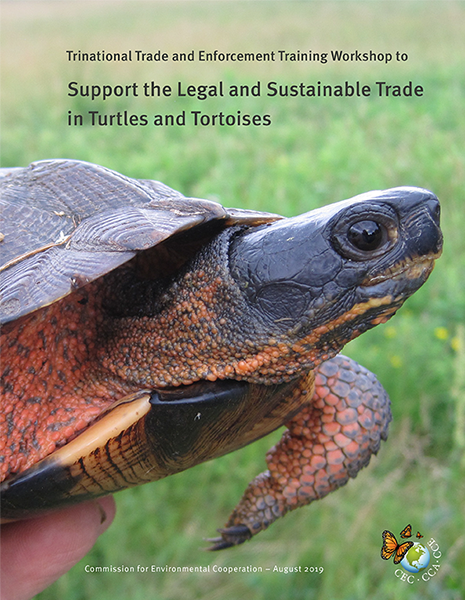Trinational Trade and Enforcement Training Workshop to Support the Legal and Sustainable Trade in Turtles and Tortoises
Trinational Trade and Enforcement Training Workshop to Support the Legal and Sustainable Trade in Turtles and Tortoises
Description
The Commission for Environmental Cooperation (CEC) held the Trinational Trade and Enforcement Training Workshop to Support the Legal and Sustainable Trade in Turtles and Tortoises in Miami, Florida, United States, from 24 to 26 October 2018. The development of this workshop was identified as a priority action in the CEC Action Plan for North America: Sustainable Trade in Turtles and Tortoises (CEC 2017). The workshop objectives were extensive and sought to understand the ecology and life-history traits of turtles, recognize the challenges presented by trade (both pet and meat trade), identify research and management needs to help achieve sustainable trade and maintain viability of wild populations in North America, develop or revise policy for achieving turtle conservation, and revise a priority-species list.
The topics covered during the workshop addressed conservation, management, and enforcement needs. The workshop was conducted by holding specific sessions focusing on CITES Appendix II species, turtle life-histories, and discussions about non-detriment findings (NDFs), sustainable trade, sustainable harvest, captive breeding (including farming and ranching), and law enforcement. Participants from Canada, Mexico, and the United States sought to explain and understand how each country addressed trade in tortoises and freshwater turtles, in the context of CITES, with the overall goal of increasing trinational cooperation to support the sustainable trade of twelve species identified as priority species in Action Plan for North America: Sustainable Trade in Turtles and Tortoises. As part of this workshop, the participants visited the United States Fish and Wildlife Service (USFWS) Wildlife Inspection offices at the Port of Miami to learn methodologies and challenges associated with wildlife trade and enforcement. A closed-door enforcement session allowed confidential sharing of information among participants from the three countries who have enforcement responsibilities. Although the workshop focused on identifying how legal and sustainable trade can be facilitated and promoted under CITES, awareness of the magnitude of the illegal trade that is occurring was also discussed. Workshop participants outlined action items that may help promote sustainable legal trade, and also outlined suggestions and recommendations for addressing illegal trade. This workshop report includes information compiled by the facilitator prior or during the workshop to support discussions and is included in this report as reference.
Additional Information
